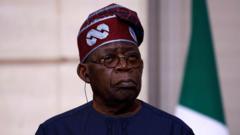The Trump administration's latest policy could have profound implications for diplomatic ties and free speech in both the U.S. and Brazil.
**Trump Administration Escalates Censorship Debate by Targeting Brazilian Supreme Court Justice**

**Trump Administration Escalates Censorship Debate by Targeting Brazilian Supreme Court Justice**
A bold action by the U.S. government could reshape international relations amid ongoing censorship tensions.
In an unprecedented move, the Trump Administration has directed its focus towards Brazilian Supreme Court Justice Alexandre de Moraes, who has gained notoriety for his stringent measures against what he describes as threats to Brazil’s democratic integrity. Moraes has ordered the removal of numerous right-wing social media accounts, positioning himself as a champion for democracy among Brazil's leftist groups, while earning accusations of censorship from conservative factions.
This controversy escalated recently when U.S. Secretary of State Marco Rubio announced a new policy that restricts visas for foreign officials deemed responsible for censoring protected expression. Although Rubio's statement did not mention Moraes by name, it is widely interpreted as a direct reference due to Brazil's recent history of internet censorship, particularly against political dissidents.
The implications are significant, as Moraes has also attracted the ire of powerful figures such as Elon Musk and former Brazilian president Jair Bolsonaro, who is accused of orchestrating plots against him. The tension surrounding Moraes illustrates a political divide within Brazil and could lead to a diplomatic crisis between two prominent nations in the Western Hemisphere.
Critics of the U.S. policy warn that targeting foreign judges for their decisions can set a precarious precedent, potentially weakening international legal foundations and complicating diplomatic relationships further. As the situation evolves, the global community watches closely to see how this will affect both countries' approach to free speech and censorship going forward.
This controversy escalated recently when U.S. Secretary of State Marco Rubio announced a new policy that restricts visas for foreign officials deemed responsible for censoring protected expression. Although Rubio's statement did not mention Moraes by name, it is widely interpreted as a direct reference due to Brazil's recent history of internet censorship, particularly against political dissidents.
The implications are significant, as Moraes has also attracted the ire of powerful figures such as Elon Musk and former Brazilian president Jair Bolsonaro, who is accused of orchestrating plots against him. The tension surrounding Moraes illustrates a political divide within Brazil and could lead to a diplomatic crisis between two prominent nations in the Western Hemisphere.
Critics of the U.S. policy warn that targeting foreign judges for their decisions can set a precarious precedent, potentially weakening international legal foundations and complicating diplomatic relationships further. As the situation evolves, the global community watches closely to see how this will affect both countries' approach to free speech and censorship going forward.





















